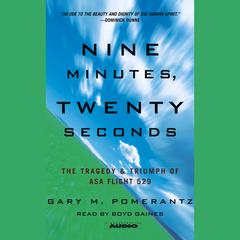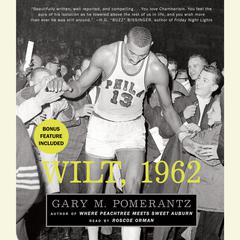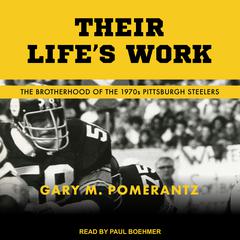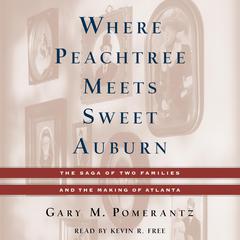 Play Audiobook Sample
Play Audiobook Sample
Wilt, 1962: The Night of 100 Points and the Dawn of a New Era Audiobook
 Play Audiobook Sample
Play Audiobook Sample
Quick Stats About this Audiobook
Total Audiobook Chapters:
Longest Chapter Length:
Shortest Chapter Length:
Average Chapter Length:
Audiobooks by this Author:
Publisher Description
On the night of March 2, 1962, in Hershey, Pennsylvania, right up the street from the chocolate factory, Wilt Chamberlain, a young and striking athlete celebrated as the Big Dipper, scored one hundred points in a game against the New York Knickerbockers. As historic and revolutionary as the achievement was, it remains shrouded in myth. The game was not televised; no New York sportswriters showed up; and a fourteen-year-old local boy ran onto the court when Chamberlain scored his hundredth point, shook his hand, and then ran off with the basketball. In telling the story of this remarkable night, author Gary M. Pomerantz brings to life a lost world of American sports. In 1962, the National Basketball Association, stepchild to the college game, was searching for its identity. Its teams were mostly white, the number of black players limited by an unspoken quota. Games were played in drafty, half-filled arenas, and the players traveled on buses and trains, telling tall tales, playing cards, and sometimes reading Joyce. Into this scene stepped the unprecedented Wilt Chamberlain: strong and quick-witted, voluble and enigmatic, a seven-footer who played with a colossal will and a dancer’s grace. That strength, will, grace, and mystery were never more in focus than on March 2, 1962. Pomerantz tracked down Knicks and Philadelphia Warriors, fans, journalists, team officials, other NBA stars of the era, and basketball historians, conducting more than 250 interviews in all, to recreate in painstaking detail the game that announced the Dipper’s greatness. He brings us to Hershey, Pennsylvania, a sweet-seeming model of the gentle, homogeneous small-town America that was fast becoming anachronistic. We see the fans and players, alternately fascinated and confused by Wilt, drawn anxiously into the spectacle. Pomerantz portrays the other legendary figures in this story: the Warriors’ elegant coach Frank McGuire; the beloved, if rumpled, team owner Eddie Gottlieb; and the irreverent p.a. announcer Dave “the Zink” Zinkoff, who handed out free salamis courtside. At the heart of the book is the self-made Chamberlain, a romantic cosmopolitan who owned a nightclub in Harlem and shrugged off segregation with a bebop cool but harbored every slight deep in his psyche. March 2, 1962, presented the awesome sight of Wilt Chamberlain imposing himself on a world that would diminish him. Wilt, 1962 is not only the dramatic story of a singular basketball game but a meditation on small towns, midcentury America, and one of the most intriguing figures in the pantheon of sports heroes. Also available as a Random House AudioBook
Download and start listening now!
"i gave this last year to tom nelson. true story of a murder in kc in the 1930's. lots of names of well known kansas citians, fun to read the history of the times..wondering who nana and grandaddy knew. a little heavy on the bridge game aspect. but well worth reading. "
— Jwolfe5 (4 out of 5 stars)
Quotes
-
“Gary Pomerantz’s Wilt, 1962 is beautifully written, well reported, and compelling. But what’s so special about this book, what causes it to linger, is the atmosphere that Pomerantz has captured through his words, so bittersweet and haunting. You love Wilt Chamberlain. You feel the aura of his isolation as he towered above the rest of us in life, and you wish more than ever he was still around because of his very individuality.”
— H. G. “Buzz” Bissinger, New York Times bestselling author of Friday Night Lights -
“In his undeniable excellence and egotism, Wilt Chamberlain was America itself, inspiring worship, ambivalence, and downright awe.”
— Philadelphia Inquirer -
“Genius is in the details, and Gary Pomerantz’s Wilt, 1962 proves that.”
— John Feinstein, New York Times bestselling author of A Season on the Brink -
“Meticulously researched and superbly crafted, Wilt, 1962 revisits and vividly re-creates a seminal but overlooked moment in American sports history. On that transformative evening in Hershey, Pennsylvania, Wilt Chamberlain scored one hundred points and staked a black man’s claim to the city game. In Gary Pomerantz’s deft possession-by-possession retelling, Chamberlain soars again. The gangly, uncompromising seven-footer who always seemed too big for the uniform he inhabited thunders back to life.”
— Jane Leavy, New York Times bestselling author of The Last Boy -
“In this age of instant everything, few people have any idea who Wilt Chamberlain really was and what he meant to sports. Gary Pomerantz shows us. In Wilt, 1962 he puts us courtside for one of the greatest unexamined moments in sports history, the night Wilt scored one hundred points. In a sweet return to his sportswriting roots, Pomerantz gives us Wilt in his realm, his rise to prominence and dominance, set against the backdrop of the NBA’s coming of age. It’s all irresistible.”
— Michael Wilbon, cohost of ESPN’s Pardon the Interruption -
“[A] surprisingly touching narrative, Pomerantz does a remarkable job of making Chamberlain, the world he inhabited, and that mythic night shine all over again.”
— Publishers Weekly -
“While Pomerantz writes a suspenseful narrative of the game, he also delivers an engaging, full-bodied portrait of one of the great athletes of our time. An excellent companion to Cherry’s biography but also a sports book that can stand on its own.”
— Booklist -
“Wilt, 1962 is not only a lively sports story about the record-setting performance of a larger-than-life athlete, it is also a wonderful chronicle of urban and social history, replete with colorful characters and situations from a bygone era of professional basketball, when the game changed from being dominated by white stars to being dominated by black ones.”
— Gerald L. Early, author of This Is Where I Came in: Black America in the 1960s
Wilt, 1962 Listener Reviews
-
" Good material but kind of repetitive in some parts. "
— Courtney, 3/29/2013 -
" A terrific account of the game, but a better look at the personalities and the era. "
— Eric, 2/10/2013 -
" Interesting, but could have been half as long. "
— Neal, 9/17/2012 -
" a fun read...best thing i remember is the story about the kid who ripped the ball from wilt's hands after the game. "
— Goatville9, 9/16/2011 -
" The story of Wilt Chamberlin scoring 100 points during an NBA game between the Philadelphia Warriors and Knicks in Hershey Pennslvania on March 2, 1962. "
— Sean, 7/12/2011 -
" The outline of the book is pretty well set by mid-way through it, so it really starts to slow down once you realize where things are going. "
— Ethan, 12/31/2010 -
" Non-fiction. The history of Kansas City in the 20's and 30's was interesting alongside the history of bridge and the Bennett murder at that same time. Enjoyed it. "
— Ange, 8/2/2010 -
" Read like a history report; it was a bit disconnected as the author followed tangents giving extensive background on incidental characters. "
— Carol, 7/27/2010 -
" <br/>this book is especially appealing to readers who know Kansas city and play bridge. "
— Beverly, 5/14/2010 -
" I tried to bridge a bit in my MSA days, so I understand the appeal. What I really like about this book is snapshot of life in Kansas City during the 1920s. Thanks to Boss Tom, Prohibition really didn't apply to KC. "
— Eric, 2/6/2010 -
" I thought there would be more intrigue to the story by the way my friend who recommended it described the book. Instead, I was pleasantly surprised to find that it was a very well written social history book about the era that bridge was 'the craze' in America. "
— Wally, 9/28/2009 -
" Good book. Not super well written, but I enjoyed it. The history was good, especially if you like both American history and card playing. The writing was okay but not great. Three stars I'd say. "
— Todd, 9/24/2009
About Gary M. Pomerantz
Gary M. Pomerantz is an author, journalist, and visiting lecturer in the Department of Communication at Stanford. A 1982 graduate of the University of California, Berkeley, he worked for nearly two decades as a daily journalist, on staff at the Washington Post and Atlanta Journal-Constitution, initially as a sportswriter and then writing columns, editorials, and special projects. He later served as a distinguished visiting professor of journalism at Emory University in Atlanta. He lives in the San Francisco Bay Area with his wife and their three children.
About Stephen Hoye
Stephen Hoye has worked as a professional actor in London and Los Angeles for more than thirty years. Trained at Boston University and the Guildhall in London, he has acted in television series and six feature films and has appeared in London’s West End. His audiobook narration has won him fifteen AudioFile Earphones Awards.




























